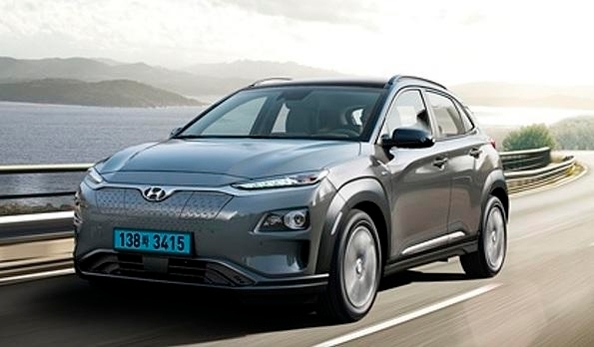Hyundai Motor will replace the battery systems in about 82,000 electric vehicles sold here and abroad due to fire risks, the company announced Wednesday.
The voluntary recall, which affects three electric vehicle models -- Kona, Ioniq and Elec City -- comes after South Korea’s Transport Ministry said a series of fires involving Kona vehicles had most likely been caused by short circuits in defective high-voltage battery cells.
The automaker will be recalling a total of 81,701 units of the three cars -- 26,699 units in Korea and 55,002 units in other countries.
All of the vehicles subject to recall were equipped with battery cells produced by LG Energy Solution at its battery plant in Nanjing, China from September 2017 to July 2019, according to the ministry.
The battery cells appear to have a flaw in their cathode tabs, making them prone to short circuits, it said. It added, however, that the investigation was not yet complete.
LG Energy Solution disputed the claim, saying there was no evidence the cathode tabs in its battery cells were the direct cause of the fires and that its Chinese production plant had made improvements.
LG also said it has found that Hyundai Motor had “misaligned” the battery management system, and that it will cooperate with related institutes to find out if that is the cause of the fire.
The Ministry of Land, Infrastructure and Transport and the Korea Transportation Safety Authority have been investigating since the series of unexplained fires involving Kona electric vehicles.
The Korea Automobile Testing & Research Institute under the Korea Transportation Safety Authority said it had run several tests on the battery cells and found the fires caused during the tests resembled fires that occurred in Kona electric vehicles.
The recall process will start from March 29. Vehicles subject to recall here can be fixed at Hyundai service centers and Bluehands free of charge.
In a regulatory filing on Wednesday, Hyundai said the recall process is expected to cost about 1 trillion won ($900 million), though the final amount will be decided later, after the company settles on how they will share the expenses with LG Energy Solution.
Hyundai said it plans to reflect the recall costs in the fourth-quarter earnings for 2020.
“We will put customer safety as the utmost priority, and continue to promote active protection policies, to take immediate actions when a quality issue occurs, and to improve quality of the products to prevent recurrence,” the automaker said in the filing.
Since the Kona’s launch in 2018, a total of 14 battery-related fires, including four overseas, have been reported.
In the last recall program, the automaker had recalled about 77,000 units built between September 2017 and March 2020 to update the battery management system. But the adequacy of the recall came into question when a recalled Kona vehicle caught on fire for an unknown reason last month.
On Tuesday, Hyundai Motor Chairman Chang Jae-hoon apologized over the accidents involving its electric vehicle, speaking at the unveiling event of the company’s latest electric car, the Ioniq 5.
“We have been sincerely cooperating with the Transport Ministry with our battery producer partner for the investigation on the causes of the accident. The results are expected to come out soon, and we will be able to inform you, along with the government,” Chang said.
By Jo He-rim (
herim@heraldcorp.com)


![[KH Explains] Why Yoon golfing is so controversial](http://res.heraldm.com/phpwas/restmb_idxmake.php?idx=644&simg=/content/image/2024/11/13/20241113050608_0.jpg)





![[KH Explains] For Korean automakers, Chinese EVs may loom larger than Trump’s tariffs](http://res.heraldm.com/phpwas/restmb_idxmake.php?idx=644&simg=/content/image/2024/11/14/20241114050537_0.jpg)